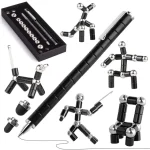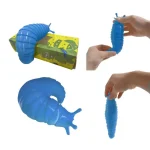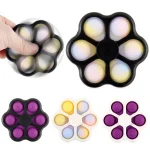Table of Contents
What is a Fidget Spinner?
A fidget spinner is a small toy made of plastic and lightweight metal, designed to spin around a central bearing. It consists of three main parts: the central bearing, weighted arms, and the outer casing.
The central bearing is the core component, allowing the spinner to rotate smoothly and effortlessly. Most fidget spinners use high-quality steel ball bearings located at the center. This ensures that the spinner can keep spinning for a long time, maintaining its momentum.
In addition to the central bearing, fidget spinners have bearings in the arms to provide weight on the outer part of the spinner, creating a balance that helps with spinning. These outer bearings contribute to the rotational force and inertia of the spinner, allowing for smoother and longer spins.
Fidget spinners are not only suitable for children, but also popular among adults. They are suitable for people of all ages and can be used in various occasions.
Some fidget spinners come with additional features like LED lights, various textures for tactile stimulation, or unique shapes for visual appeal. These extra elements enhance the overall sensory experience, making the spinners more attractive to users.
Fidget Spinner Benefits
Fidget spinners have become popular as tools to help people stay calm, and improve fine motor control. Some people believe that they can relieve stress and boosting focus, especially for those with Attention Deficit Hyperactivity Disorder (ADHD) benefits. The primary purpose of fidget spinners is to provide a simple, engaging way to occupy the hands and mind.
Boosting Focus and Reducing Stress
Fidget spinners are widely known for their ability to improve focus, reduce stress, and provide a calming effect. This has sparked curiosity about how they can help with attention and stress relief.
One way they help with focus is by engaging users in a simple, repetitive task. The spinning motion serves as a sensory input, helping to divert and focus the user’s attention.
By concentrating on the spinner, people can filter out distractions and focus better on the task at hand. This can be especially beneficial during work or study sessions that require sustained attention.
Engaging with the spinner’s physical motion encourages users to be more aware of their surroundings and their own body. This mindfulness practice can help reduce anxiety and stress by shifting focus away from worrisome thoughts or overwhelming emotions.
Helping ADHD Patients Stay Focused
People with ADHD often struggle to maintain attention, stay focused, and avoid distractions. Fidget spinners have gained popularity as potential tools to help those with ADHD improve their focus.
One theory is that fidget spinners can help channel restless energy, allowing users to direct excess movements into a controlled, repetitive action. This provides a physical outlet and can help people with ADHD release pent-up energy, making it easier for them to concentrate.

By engaging in the spinning motion, individuals with ADHD may find it easier to remain focused and attentive.
Unlike other toys or activities that may be noisy or distracting to others, fidget spinners are relatively quiet and discreet. This allows ADHD patients to use them in various settings, such as classrooms or workplaces, without disturbing others.
Enhancing Fine Motor Skills
Fine motor skills are crucial for performing everyday tasks that require small, precise movements, such as buttoning a shirt, writing, or using utensils. People who struggle with fine motor control may find these activities challenging, impacting their overall quality of life. Fidget spinners have become popular as tools for enhancing fine motor control through manipulation.
Playing with a fidget spinner involves gripping, spinning, and balancing, which can help improve hand dexterity and coordination. This repetitive action requires small, controlled movements, providing an excellent exercise for fine motor skills.
Activities that involve fine motor skills positively affect cognitive functions, such as memory, attention, and problem-solving abilities. Therefore, using a fidget spinner to enhance fine motor control may also indirectly benefit cognitive functions.
Fidget spinners can be especially beneficial for individuals with conditions that affect fine motor control, such as developmental disorders or neurological conditions. For example, people with ADHD or autism may struggle with fine motor tasks, making it challenging to perform precise and coordinated activities. By engaging with fidget spinners, these individuals can participate in sensory-motor activities that promote the development of fine motor skills in a fun and engaging way.
Conclusion
Overall, fidget spinners have various potential benefits, including improving focus, reducing stress, and enhancing attention and fine motor skills. Whether as a tool for relaxation, focus management, or motor skill development, fidget spinners can be valuable for individuals seeking to enhance their overall well-being and performance in various aspects of life.






